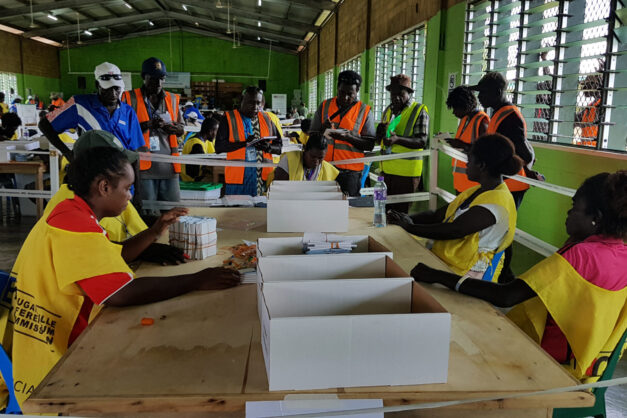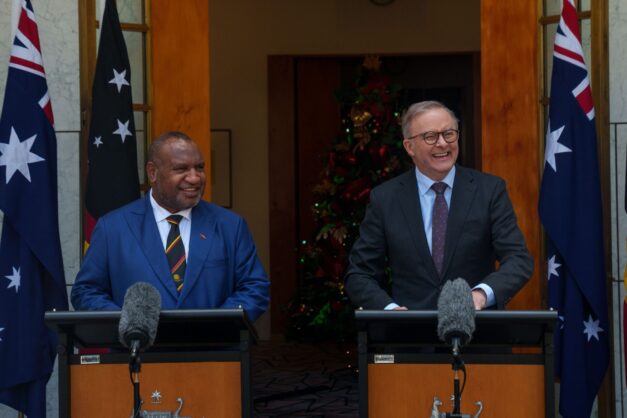Why PNG’s 2022 election is facing controversy

AFP/Llane Mugau
Papua New Guinea’s 2022 election has only just started, but its integrity is already under attack, Henry Ivarature and Michael Kabuni write.
General elections in Papua New Guinea (PNG) are underway, and are unfortunately already marred with reports of controversy and electoral violence, including the shooting of a returning officer, as well as candidates’ supporters burning the vehicles of rivals.
This is nothing new to PNG. In the 2017 election, more than 200 people died, with some describing it as the worst election in PNG’s history.
Beyond violence, that election too was marred by controversy. 50 per cent of incumbent MPs lost their seats, no women were elected, and several disputed results took years to resolve, with one overturned after four years.
Official observers from the Commonwealth Observer Group and The Australian National University gave a number of recommendations in 2017 to improve the quality and integrity of future elections.
One key recommendation called on the government to release funds for voter registration in a timely manner for the PNG Electoral Commission to update its electoral rolls. In 2017, thousands of eligible voters could not vote due to faulty electoral rolls.
Unfortunately, 2022 is shaping up to be more of the same, as a result of the government’s failure to act on and implement these and other electoral reforms. Crucially, a delay in funding for the election commission prevented a major update of the electoral roll.
Updating the roll only began in January 2022 – about five months before voting was scheduled to begin. In March, when the writs were about to be issued, one MP claimed over 500,000 eligible voters in his constituency were not listed. At the time of writing, it is not clear if the update has been completed.
The lack of a national census has made effectively updating the roll even more difficult, with the most recent census postponed to 2024. Information provided by the census, such as the age of individuals helps with the common roll update in determining the number of eligible voters in each electorate. This is critical in election management, particularly for the printing and distribution of ballot papers throughout the country. Without this information, expect problems of ballot paper shortage or over-supply in many constituencies.
The government’s last-minute decision to create seven new constituencies on the eve of the last parliament’s term, which the Opposition unsuccessfully attempted to block, likely compounds this issue further.
Notably, the government made this decision after ballot papers were already printed. Consequently, the electoral commission was forced to delay the issue of writs, destroy the ballot papers of affected constituencies, and reprint new ones. The matter is now before the Supreme Court, only weeks before the start of voting.
The Opposition argues that due to the lack of a recent census the redistricting is not supported by accurate and reliable data. Redistricting is ideally based on population quotas, calculated by the average population of a district. With the census in 2001 considered inaccurate, the Opposition says redistricting on the basis of 2001 information is unconstitutional and invalid. If the Supreme Court determines it to be so, then the seven MPs from the new constituencies will automatically be disqualified from parliament.
Moreover, a recent Supreme Court ruling disqualifying candidates with criminal offences after 2002 could create a backlog for the courts and slow the democratic process.
As yet, the government has also failed to stem election violence in PNG. Despite introducing measures including the purchasing of armoured vehicles and the passage of a new gun control law that carries high fines and tough penalties, political violence remains widespread.
Whether this will do anything to curb the approximately 50,000 illegal firearms in circulation across the country is yet to be seen. Policing the elections has always been difficult and the support of the Australian Defence Forces is a welcome contribution to public safety. The PNG police force needs this support, it is chronically underfunded and severely lacking in manpower, with only one officer for every 1,145 people – the sixth-highest number reported globally.
In the last five years, the government has failed to address four crucial and interdependent pre-voting stages – updating electoral laws, electoral procedures, district boundaries, and voter registration. Missing just one of these stages affects the rest of the electoral process.
Going forward, the government must complete the national census to review the redistricting and undertake a comprehensive update of the common roll as well as enact the necessary electoral reforms to protect democracy and the integrity of elections.
Henry Ivarature & Michael Kabuni
More Stories

Security Snapshot - 1 Mar 2024
Pacific Security Snapshot | 01 March 2024
The security stories shaping the region ➣ Pacific Islands Leaders Meeting (PALM) to be held in Tokyo in July 2024 ➣ 2023 warmest year on record, globally ➣ Elections across the Pacific prompting changes to diplomatic relations and security arrangements ➣ Extractive industries booming ➣ Environmental conservation efforts ongoing ➣ PNG riots shed light on…

Blog - 11 Dec 2023
A PNG-Australia security framework: not a treaty but solid nonetheless
Papua New Guinea PM James Marape and Australian PM Anthony Albanese face the media after signing a historical Bilateral Security Agreement on 7 December in Canberra. Credit: PM Albanese Facebook On 7 December 2023, the prime ministers of Australia and Papua New Guinea signed an historic security agreement in Canberra. It has taken approximately…






